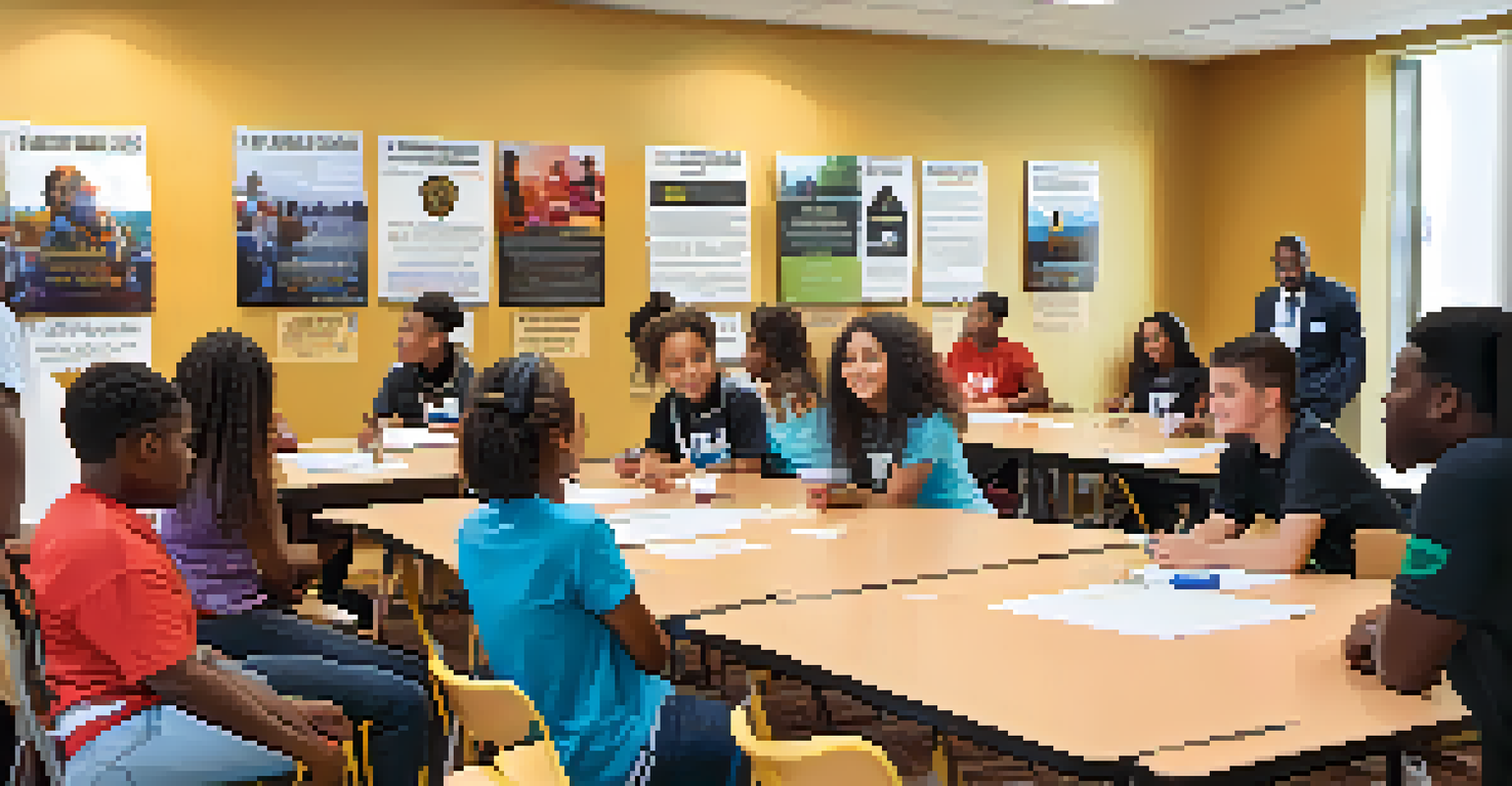The Impact of Colorado Nonprofits on Education and Youth

The Role of Nonprofits in Supporting Education in Colorado
In Colorado, nonprofits play a vital role in enhancing educational opportunities. They often step in where funding gaps exist, providing essential resources for schools and students. This support ranges from after-school programs to scholarships, ensuring that education is accessible to all.
Education is the most powerful weapon which you can use to change the world.
For instance, organizations like the Colorado Education Initiative work tirelessly to improve student outcomes through innovative strategies. Their efforts not only help in developing academic skills but also foster social and emotional learning. This holistic approach ensures that students are well-rounded and prepared for future challenges.
By collaborating with schools and communities, these nonprofits create a supportive ecosystem that promotes educational success. Their influence is profound, as they empower educators and uplift students, making a lasting impact on the state's educational landscape.
Empowering Youth Through Skill Development Programs
Many Colorado nonprofits focus on youth empowerment through skill development initiatives. Programs targeting leadership, entrepreneurship, and vocational skills equip young people with the tools they need for success. These initiatives often blend learning with real-world experience, offering internships and mentorships.

For example, the Young Americans Center for Financial Education teaches financial literacy to youth, giving them a head start in managing their finances. Such programs not only prepare students for the workforce but also instill confidence and self-reliance. This empowerment is crucial in helping youth navigate life’s challenges.
Nonprofits Bridge Education Gaps
In Colorado, nonprofits provide critical resources and support to enhance educational opportunities and address funding shortfalls.
As these young individuals gain skills, they become more active members of their communities. The ripple effect of this empowerment can be seen in increased civic engagement and a commitment to lifelong learning, ultimately benefiting society as a whole.
Fostering Inclusivity and Diversity in Education
Inclusivity and diversity are central themes for many Colorado nonprofits working in education. These organizations strive to create environments where all students, regardless of their background, feel valued and supported. By promoting diverse curricula and inclusive practices, they break down barriers to learning.
The best way to predict your future is to create it.
One notable example is the Latino Community Foundation of Colorado, which focuses on elevating the voices and experiences of Latino youth. Their initiatives aim to foster a sense of belonging while also enhancing academic achievement. By embracing diversity, they enrich the educational experience for everyone.
Through such efforts, nonprofits help cultivate a more equitable educational system. This commitment to inclusivity not only benefits students but also prepares them to thrive in a multicultural society, fostering empathy and understanding among peers.
Addressing Mental Health and Wellbeing in Schools
Mental health is an increasingly important focus for Colorado nonprofits working with youth. Recognizing that emotional wellbeing is crucial for academic success, many organizations offer mental health resources and support. These programs provide counseling, workshops, and training for educators on identifying and addressing mental health issues.
For instance, the Colorado Mental Wellness Network collaborates with schools to implement mental health education and support systems. By creating safe spaces for students to express their feelings, they contribute to a healthier school environment. This proactive approach helps destigmatize mental health discussions among youth.
Empowering Youth with Skills
Many Colorado nonprofits focus on skill development programs that equip youth with essential tools for success in life and work.
As mental health awareness grows, nonprofits play a key role in equipping students with coping strategies and resilience. This focus not only enhances individual wellbeing but also fosters a culture of support and understanding within educational institutions.
Enhancing Community Engagement in Education
Community engagement is essential for a thriving educational ecosystem, and Colorado nonprofits excel in this area. They work to connect schools with local communities, creating partnerships that enhance learning experiences. These collaborations often lead to resource sharing and increased volunteer involvement.
A prime example is the Colorado Alliance for Environmental Education, which connects schools with environmental organizations. This partnership allows students to engage in hands-on learning experiences, fostering a sense of stewardship for their environment. Such initiatives not only enrich the curriculum but also strengthen community ties.
By promoting community involvement in education, nonprofits help bridge the gap between students and their surroundings. This engagement fosters a sense of belonging and responsibility, encouraging students to contribute positively to their communities.
The Impact of Nonprofits on Educational Policy and Advocacy
Nonprofits in Colorado don’t just support education at the grassroots level; they also play a crucial role in shaping educational policy. Many organizations engage in advocacy efforts, working to influence legislation that affects funding, resources, and educational standards. Their voices amplify the needs of students and schools, driving meaningful change.
For example, the Colorado Children’s Campaign advocates for policies that promote equitable access to quality education. Their research and lobbying efforts have led to significant reforms that benefit students across the state. By holding policymakers accountable, nonprofits ensure that educational priorities are aligned with the needs of the community.
Advocacy Shapes Education Policy
Nonprofits in Colorado actively engage in advocacy to influence educational policies, ensuring that the needs of students and schools are prioritized.
Through these advocacy efforts, nonprofits help create a more equitable educational landscape. Their commitment to policy change enhances the overall effectiveness of the education system, ultimately benefiting future generations.
Measuring the Success of Nonprofit Initiatives in Education
Measuring success is vital for understanding the impact of nonprofit initiatives in education. Many organizations implement evaluation frameworks to assess their programs' effectiveness. This data-driven approach not only helps them refine their strategies but also demonstrates their value to stakeholders and funders.
For instance, the Colorado nonprofit, Big Brothers Big Sisters, tracks mentorship outcomes to gauge the impact on students’ academic performance and social skills. By collecting and analyzing data, they can showcase the positive effects of their programs and attract further support. This transparency builds trust and encourages community involvement.

Ultimately, these measurement efforts ensure that nonprofits remain accountable and responsive to the needs of the communities they serve. By continuously evaluating their impact, they can adapt and innovate, ensuring that their initiatives remain effective and relevant.